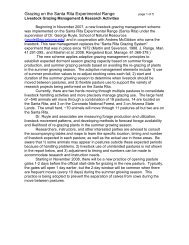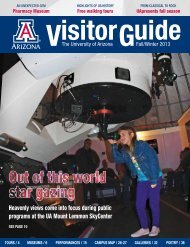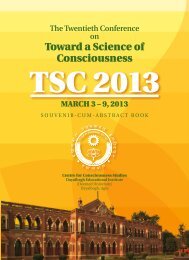CONSCIOUSNESS
Download - Center for Consciousness Studies - University of Arizona
Download - Center for Consciousness Studies - University of Arizona
- No tags were found...
You also want an ePaper? Increase the reach of your titles
YUMPU automatically turns print PDFs into web optimized ePapers that Google loves.
68 1. Philosophy<br />
This ambivalence about our conscious nature would be similar to a fish being confused about<br />
water and needing an explanation regarding the nature of water. Imagine if the fish world<br />
had to commission other fish to study the nature of water because no one in the fish kingdom<br />
had a clue about water. Is this some kind of dissociative identity disorder? Just as the fish<br />
is immersed in water and sustained by the water so are we immersed in consciousness and<br />
sustained by consciousness. Every aspect of our being is consciousness, our ability to move,<br />
to think, to love, to will, to know, to create, to invent, solve problems, to appreciate and feel<br />
the beauty in patterns of music, art, architecture, dance, decorative arts and culinary arts.<br />
Your ability to recognize patterns, to form abstract concepts in mathematics, engineering, law,<br />
philosophy, politics, legal systems, government, this is all part of the conscious experience.<br />
We have several thousand years of people experiencing transcendent states of consciousness<br />
in every religion of this world, are they all deluded or is this part of consciousness too? So<br />
if you are in such an ambivalent state about who and what you are you might want to take<br />
at look at whether you are really enjoying the conscious experience. Do you love being you,<br />
are you in love with living, do you enjoy being? Look at your emotional state, what are the<br />
prevailing emotions, are they fear, anger, sadness, confusion and boredom? Is this the reason<br />
you say I have no mind, no will, is it out of a psychic void, a loss of sense of self, loss of the<br />
self-love? So what you see as the nature of consciousness just might be a reflection of what<br />
you see in your self and when you can come out of that cocoon of despair and self induced<br />
narcotization, you might just notice that this thing called consciousness is quite wonderful. In<br />
fact, we should not have to study it at all, what we should do is celebrate it every moment we<br />
draw breath through this body. Enjoy the multitude of new ideas that play like a kaleidoscope<br />
in our minds. Enjoy your ability to dream, to create, to hope and most of all to find meaning<br />
and unity with every aspect of the universe around you. P7<br />
57 Introspection, What? Eric Schwitzgebel (Department of<br />
Philosophy, UC Berkeley-Riverside, Riverside, CA)<br />
Self-knowledge – knowledge of one’s own mind, in particular – arises in six completely<br />
different ways, none of which neatly deserve the label “introspection” I’ll argue that the six<br />
methods work together, in different proportions and combinations in different cases, and that<br />
there is no distinctive faculty of introspection. Nonetheless, there’s a commonality among the<br />
class of cognitive activities properly regarded as introspective: All involve a particular type of<br />
attention to conscious experience. C8<br />
58 Introspective Methodologies in the Science of Consciousness Maja Spener<br />
(Philosophy, Oxford, United Kingdom)<br />
It is commonly said that the science of consciousness depends on introspective access to<br />
phenomenology. Scepticism about such access has led some to doubt the possibility of genuine<br />
progress in that science. Others have maintained that the limitations of introspection can<br />
be overcome in a properly conducted science of consciousness. I show that there is truth to<br />
both perspectives, depending on which questions about consciousness one investigates. Along<br />
the way, I provide a taxonomy of introspection-based methodologies used in both psychological<br />
and philosophical investigations of consciousness. C8<br />
59 Could Radical Empiricism Guide Neurophenomenology as the Future of<br />
Neuroscience? Eugene Taylor (Humanistic/Transpersonal Psych,<br />
Saybrook University, Cambridge, MA)<br />
Neuroscientists such as Francis Crick and Francesco Varela have touted William James<br />
as a player in the solution to the so-called Hard Problem in the neurosciences - that elusive<br />
relation between the brain and the mind. William James’s phenomenology of immediate experience,<br />
what he called radical empiricism, in fact has much in common with contemporary<br />
developments in neurophenomenology. Not the least of these involve an overthrow of the<br />
subject/object dichotomy in favor of intersubjectivity, the motives of the scientist influencing<br />
what he or she studies, the phenomenology of the science-making process itself, and the<br />
humanistic implications of the neuroscience revolution that forecast an end to reductionistic







